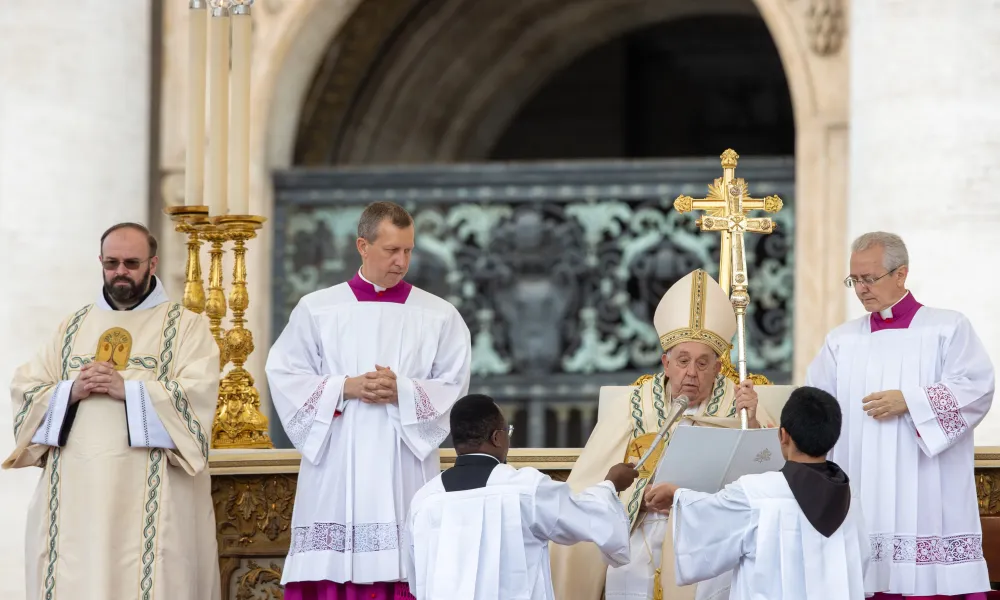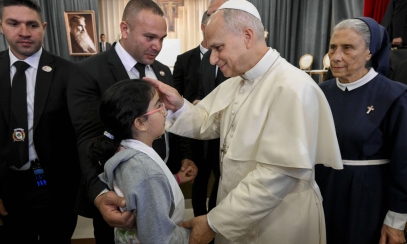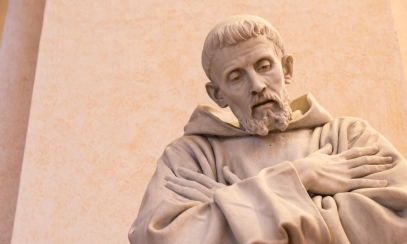
Pope Francis Canonizes 14 New Saints, Including Priests Martyred in Syria
Pope Francis canonized 14 new saints on Sunday, including a father of eight and Franciscan friars killed in Syria for refusing to renounce their faith and convert to Islam.
Pope Francis canonized 14 new saints on Sunday, including a father of eight and Franciscan friars killed in Syria for refusing to renounce their faith and convert to Islam.
In a Mass in St. Peter’s Square on Oct. 20, the pope declared three 19th-century founders of religious orders and the 11 “Martyrs of Damascus” as saints to be venerated by the global Catholic Church, commending their lives of sacrifice, missionary zeal, and service to the Church.
“These new saints lived Jesus’ way: service,” Pope Francis said. “They made themselves servants of their brothers and sisters, creative in doing good, steadfast in difficulties, and generous to the end.”
The newly canonized include St. Giuseppe Allamano, a diocesan priest from Italy who founded the Consolata missionary orders, and St. Marie-Léonie Paradis, a Canadian nun from Montreal known for founding an order dedicated to the service of priests.
Also among the saints are St. Elena Guerra, hailed as an “apostle of the Holy Spirit,” and St. Manuel Ruiz López and his seven Franciscan companions, all martyred in Damascus in 1860 for refusing to renounce their Christian faith.
The final three canonized are siblings, Sts. Francis, Mooti, and Raphael Massabki, lay Maronite Catholics martyred in Syria along with the Franciscans.
Thousands of pilgrims prayed the Litany of the Saints together in St. Peter’s Square before Pope Francis declared the 14 as enrolled among the saints “for the honor of the Blessed Trinity, the exaltation of the Catholic faith, and the increase of the Christian life, by the authority of Our Lord Jesus Christ, and of the holy apostles Peter and Paul.”
“We confidently ask for their intercession so that we too can follow Christ, follow him in service, and become witnesses of hope for the world,” the pope said.
In his homily, Pope Francis highlighted how service embodied the lives of each of the new saints. “When we learn to serve,” he said, “our every gesture of attention and care, every expression of tenderness, every work of mercy becomes a reflection of God’s love. And so we continue Jesus’ work in the world.”
The Gospel for the Mass was chanted in Greek in addition to Latin in honor of the 11 Martyrs of Damascus.
Father Marwan Dadas, a Franciscan friar from Jerusalem, was among those who attended the canonization. He said the testimony of the martyrs from the Franciscan Custody of the Holy Land is especially meaningful to people who are suffering due to the ongoing war and violence in the region today.
“This is a good message to say that even though we have challenges — and it seems we have death continuously — we still have the light of God that is helping us and guiding us through these difficult periods,” Dadas told CNA.
“It’s an important message for me, and I hope it will be the message for all the people of the Holy Land, not only the Holy Land but for everybody. It is a message from God saying that he is always with us.”
St. Giuseppe Allamano: a missionary heart
One of the most celebrated figures among the new saints is St. Giuseppe Allamano (1851–1926), an Italian diocesan priest who founded the Consolata Missionaries and the Consolata Missionary Sisters. Allamano, though he spent his entire life in Italy, left a global legacy by training missionaries who carried the Gospel to remote corners of Africa, Asia, and South America.
Allamano told the missionaries in the order he founded in northern Italy in 1901 that they needed to be “first saints, then missionaries.”
The medical miracle that led to Allamano’s canonization involved the healing of a man who was attacked by a jaguar in the Amazon rainforest. In 1996, a man named Sorino Yanomami, a member of the Indigenous Yanomami tribe in the Amazon, was mauled by a jaguar and left with life-threatening injuries.
As doctors treated his skull fractures, Consolata missionaries prayed in the hospital with a relic of Allamano, seeking his intercession. Miraculously, Yanomami recovered without any long-term damage, according to the Vatican’s Dicastery for the Causes of Saints.
Allamano, whose spiritual director was St. John Bosco, emphasized the importance of holiness in priestly life, telling his priests: “You must not only be holy, but extraordinarily holy.” His influence has endured through the orders he founded, present today in 30 countries across the globe.
St. Marie-Léonie Paradis: ‘humble among the humble’
St. Marie-Léonie Paradis (1840–1912), a Canadian religious sister, also took her place among the new saints. She founded the Little Sisters of the Holy Family, an order whose spirituality and charism is the support of priests through both prayer and by taking care of the cooking, cleaning, and laundry in rectories in “humble and joyful service” in imitation of “Christ the Servant.”
During his homily, Pope Francis praised Paradis’ faith and underlined that “those who follow Christ, if they wish to be great, must serve by learning from him” who made himself “a servant to reach everyone with his love.”
Born in the Acadian region of Quebec, Paradis also spent eight years in New York serving in the St. Vincent de Paul Orphanage in the 1860s and taught French at St. Mary’s Academy in Indiana before founding her religious order in New Brunswick, Canada.
Paradis’ canonization was supported by the miraculous healing of a newborn in Canada attributed to her intercession.
St. Elena Guerra: an ‘apostle of the Holy Spirit’
Among the canonized was St. Elena Guerra (1835–1914), known for her ardent devotion to the Holy Spirit. Guerra, who founded the Oblates of the Holy Spirit, was instrumental in promoting the first-ever novena to the Holy Spirit under Pope Leo XIII in 1895. Her writings and spiritual leadership inspired many, including St. Gemma Galgani, a mystic and saint who was her student.
For much of her 20s, Guerra was bedridden with a serious illness, a challenge that turned out to be transformational for her as she dedicated herself to meditating on Scripture and the writings of the Church Fathers. She felt the call to consecrate herself to God during a pilgrimage to Rome with her father after her recovery and went on to form the religious community dedicated to education.
During her correspondence with Pope Leo XIII, Guerra composed prayers to the Holy Spirit, including a Holy Spirit Chaplet, asking the Lord to “send forth your spirit and renew the world.”
“Pentecost is not over,” Guerra wrote. “In fact, it is continually going on in every time and in every place, because the Holy Spirit desired to give himself to all men and all who want him can always receive him, so we do not have to envy the apostles and the first believers; we only have to dispose ourselves like them to receive him well, and he will come to us as he did to them.”
The Martyrs of Damascus: courageous witnesses of faith
The solemnity of the ceremony was heightened as Pope Francis canonized the Martyrs of Damascus, a group of 11 men killed in 1860 for refusing to renounce their Christian faith and convert to Islam. The martyrs, including eight Franciscan friars and three laymen, were attacked in a church in the Christian quarter of Damascus during a wave of religious violence.
The canonized Franciscan friars include six priests and two professed religious — all missionaries from Spain except for Father Engelbert Kolland, who was from Salzburg, Austria.
Franciscan Father Manuel Ruiz, Father Carmelo Bolta, Father Nicanor Ascanio, Father Nicolás M. Alberca y Torres, Father Pedro Soler, Kolland, Brother Francisco Pinazo Peñalver, and Brother Juan S. Fernández were all declared saints.
The three laymen were brothers — Francis, Abdel Mooti, and Raphael Massabki — known for their deep piety and devotion to the Christian faith. Francis Massabki, the oldest of the brothers, was a father of eight children. Mooti was a father of five who visited the Church of St. Paul daily for prayer and to teach catechism lessons. The youngest brother, Raphael, was single and was known to spend long periods of time praying in the church and helping the friars.
According to witnesses, the brothers were offered the chance to live if they renounced their faith, but they refused. “We are Christians, and we want to live and die as Christians,” Francis Massabki reportedly said. All 11 were brutally killed that night, some beheaded, others stabbed to death.
“They remained faithful servants,” Pope Francis said. “[They] served in martyrdom and in joy.”
A global celebration
The canonization ceremony was attended by pilgrims from around the world, including Catholics from Kenya, Canada, Uganda, Spain, Italy, and the Middle East. More than 1,000 members of the Consolata order traveled to Rome to witness the canonization of their founder.
And bagpipers from Galicia in northern Spain played traditional music at the end of the Mass to honor the Spanish Franciscans canonized among the Damascus martyrs.



